
by Cora Buhlert
A New Government and Ghosts of the Past
Since December 1, West Germany has a new government and a new chancellor after the coalition government between the conservative CDU/CSU and the liberal party FDP broke apart in October.
The new chancellor is 62-year-old Kurt Georg Kiesinger, an unremarkable and not very intelligent man. What makes his election problematic is that Kiesinger was not only a member of the Nazi Party, but high-ranking official in the foreign ministry during the Third Reich. Considering that West Germany was not very thorough about purging former Nazis from public life, having an ex-Nazi occupying the highest office in the land sends a disastrous signal.
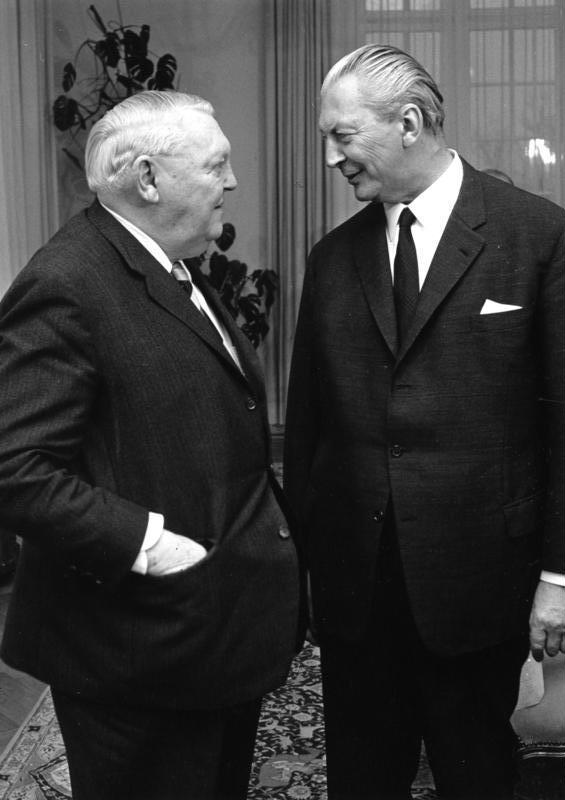
We can only hope that this government will not last long, because it is a so-called great coalition between the conservative CDU/CSU and the social-democratic party SPD, whose political aims are normally diametrically opposed. Besides, two SPD members of the new government, foreign secretary Willy Brandt and secretary for inner German issues Herbert Wehner, were driven into exile by Nazi persecution. I can't imagine them putting up with a former Nazi chancellor for long.
Space Spores and Droning Bores
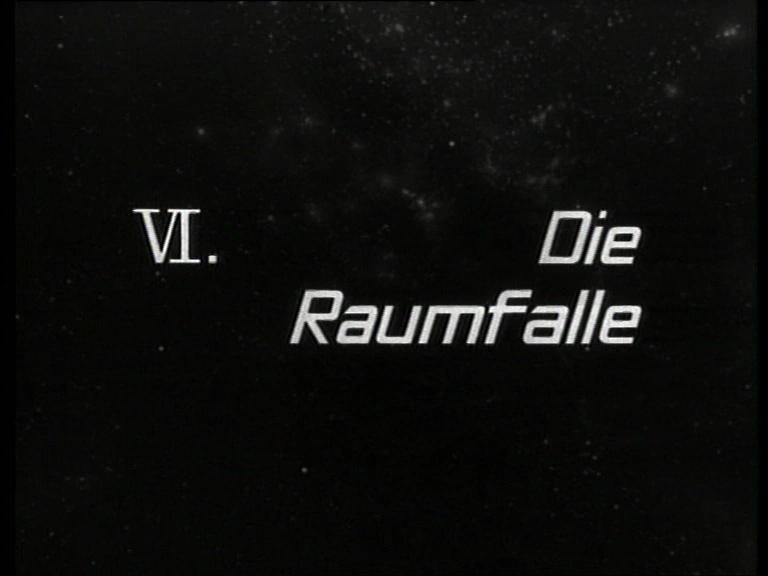
Compared to the political situation in West Germany, "Die Raumfalle" (The Space Trap), the latest episode of Raumpatrouille – Die phantastischen Abenteuer des Raumschiffs Orion (Space Patrol – The Fantastic Adventures of the Spaceship Orion) was much more enjoyable.
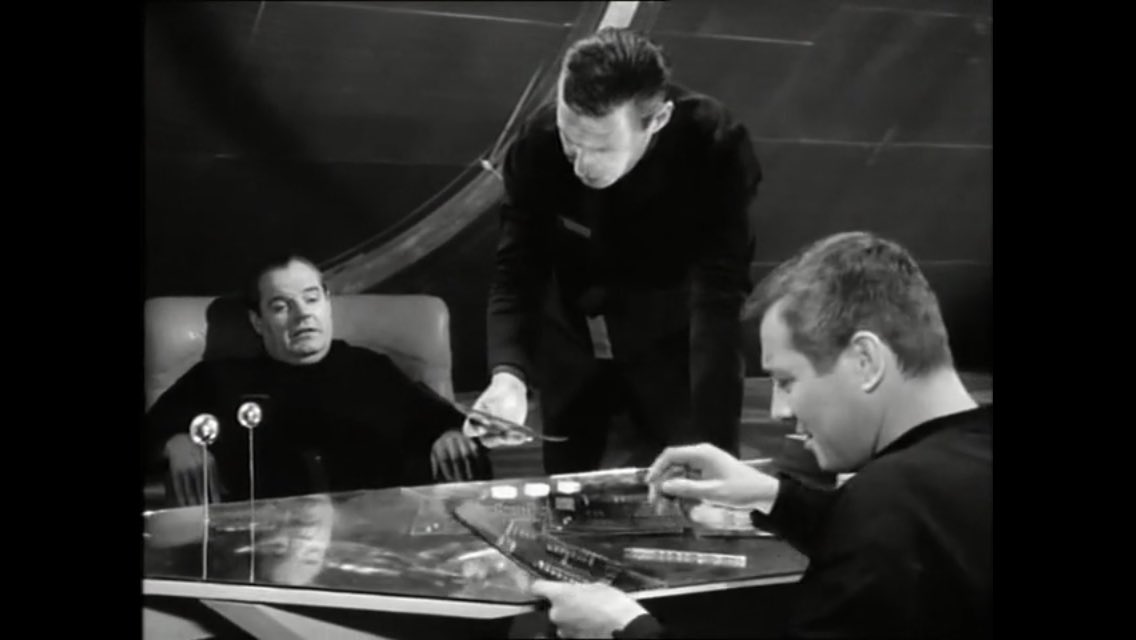
The episode starts with Commander Cliff Alister McLane (Dietmar Schönherr) receiving his latest orders from General Wamsler (Benno Sterzenbach). It's yet another routine mission (and we all know how well those tend to go for the Orion 8): Collect space dust in order to investigate the panspermia theory, which causes Wamsler's aide Spring-Brauner (Thomas Reiner) to drone on and on about the panspermia theory, i.e. the theory that life did not originate on Earth, but is distributed through the universe via spores hitching a ride with space dust, asteroids, meteorites, etc… The theory is the brainchild of Swedish scientist Svante Arrhenius, who also developed the theory of a global greenhouse caused by industrial carbon dioxide emissions, which played a role in the Orion episode "The Battle for the Sun". One of the writers is apparently a fan.
"Are you sure you want us to go on this mission?" McLane interrupts Spring-Brauner's monologue, "After all, we might disprove the theory and what would you talk about then?"
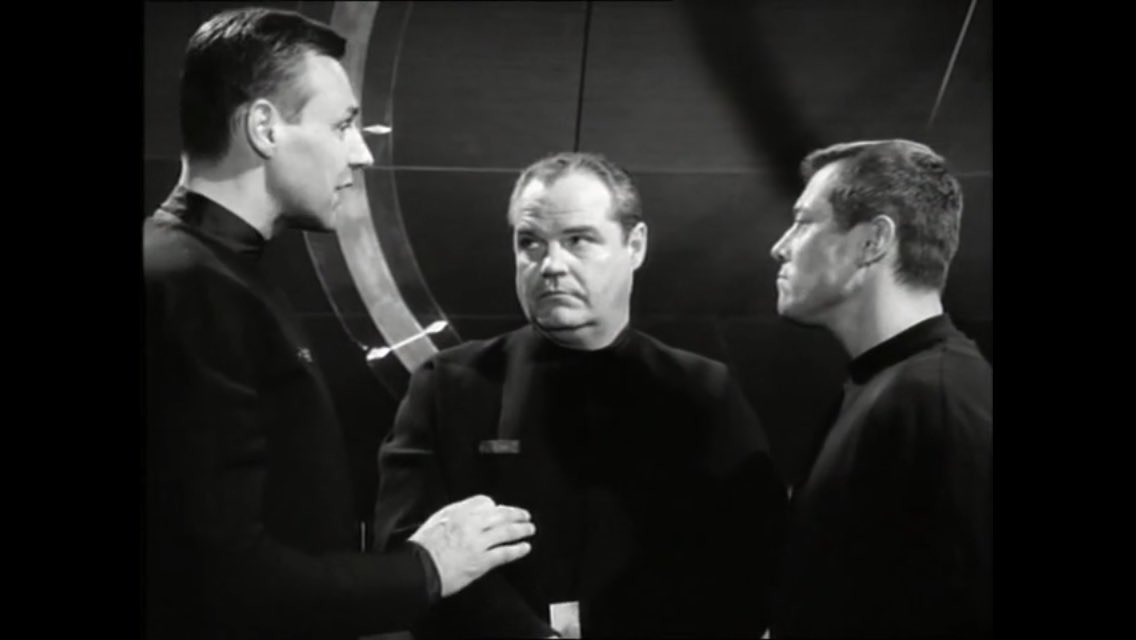
General Wamsler has another mission for McLane as well. Science fiction author Pieter Paul Ibsen (Reinhard Glemnitz), winner of the Utopia Award (no reference to the Hugo Awards, alas), wants to accompany the Orion on a mission. And since Ibsen is the future son-in-law of the secretary of interplanetary affairs, he gets his wish. McLane is as thrilled about this as you can imagine.
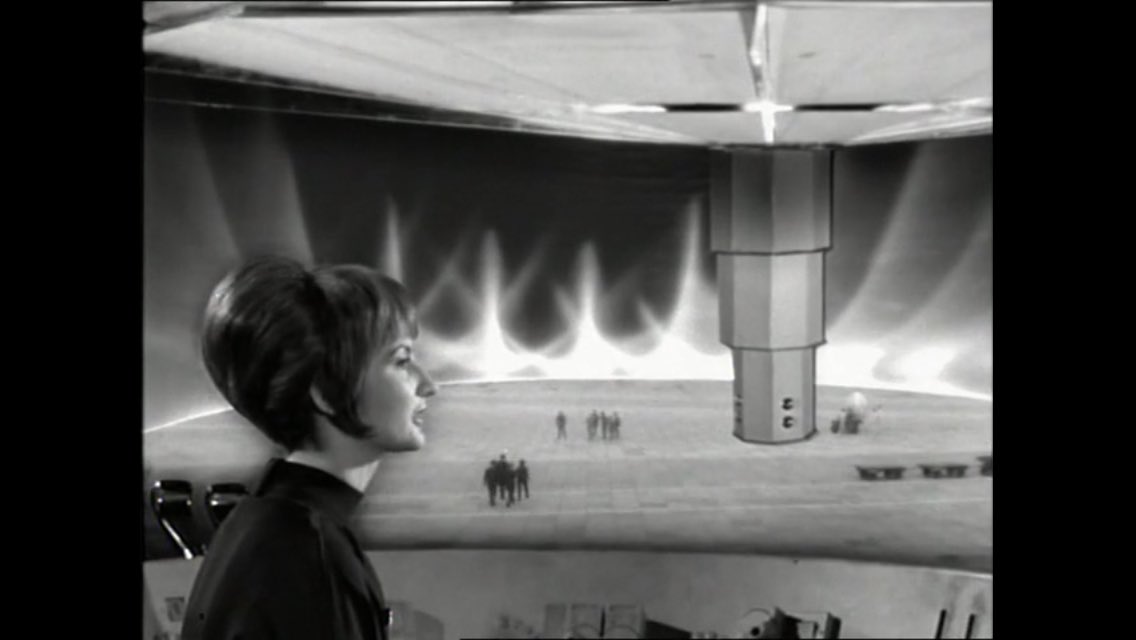
An Unwanted Passenger
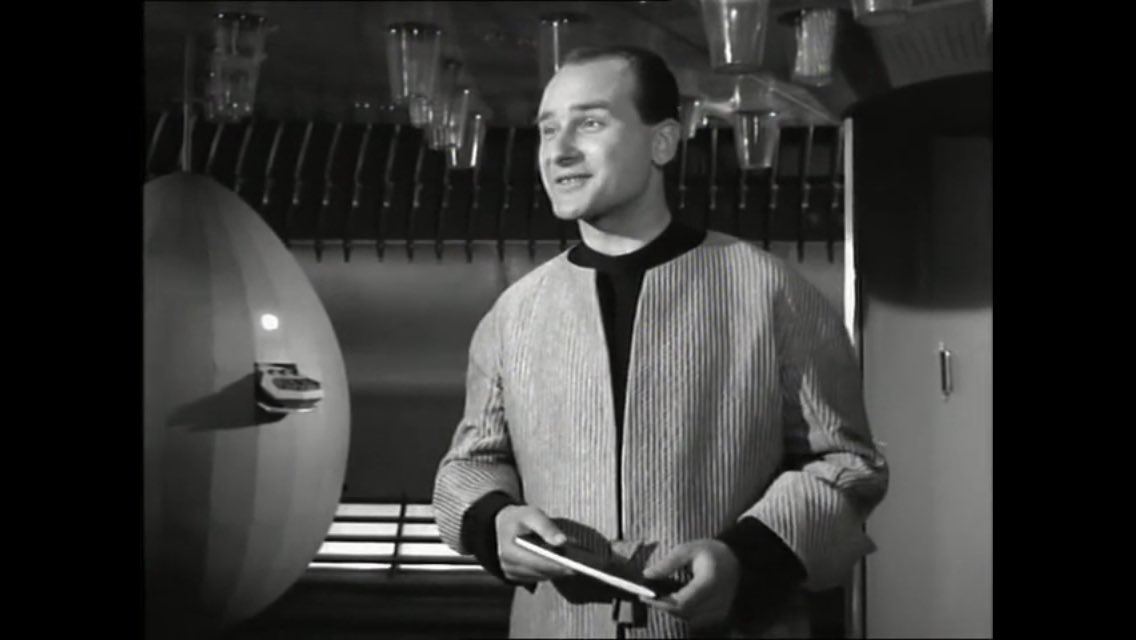
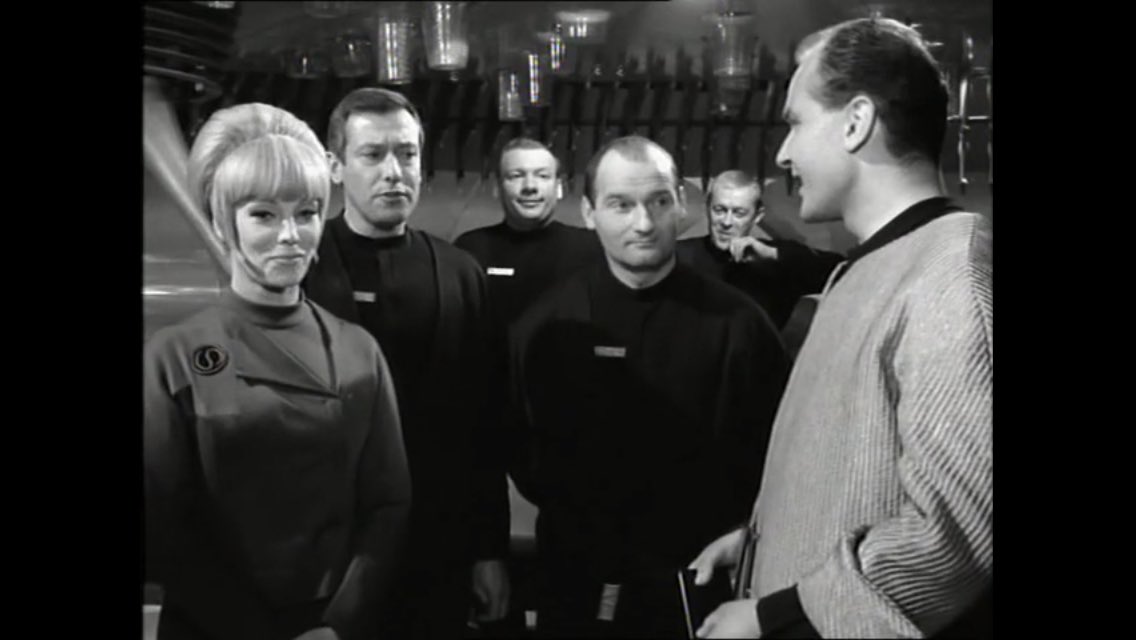
No one aboard the Orion is keen on having Pieter Paul Ibsen – nicknamed Pie-Po by the crew – along for the ride. Hasso Sigbjörnson threatens bodily harm should Ibsen enter the engine room, and Atan Shubashi (F.G. Beckhaus) complains about Ibsen's novels, where no one lands on planets anymore, they just de- and rematerialize. I wonder if this is a reference to Star Trek's transporter, though both shows probably debuted too close together to have influenced each other.
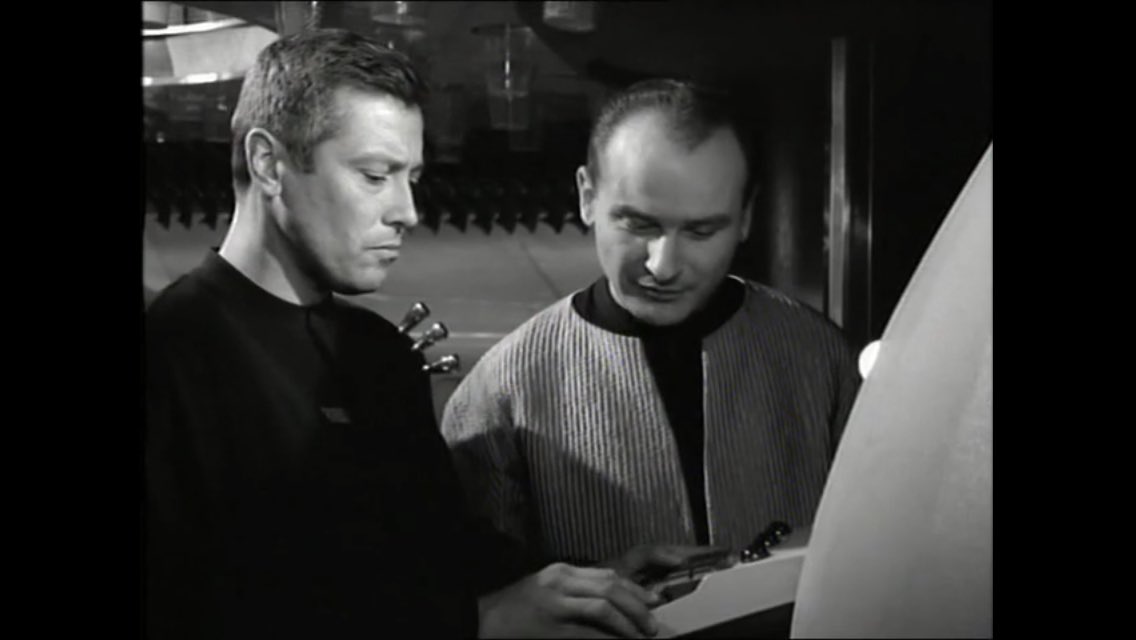
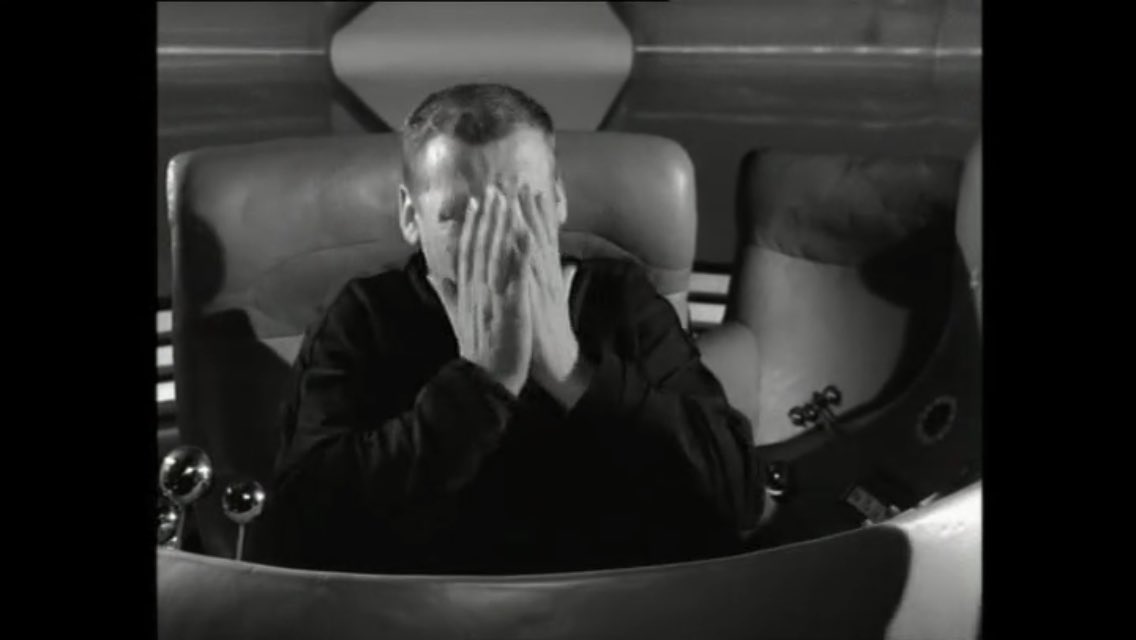
Only Helga Legrelle (Ursula Lillig) seems quite taken with Ibsen and flirts with him. And once security officer Tamara Jagellovsk (Eva Pflug) notices McLane's reaction, she decides to join in to make him jealous. The kiss between McLane and Tamara at the climax of episode 6 is not addressed in this episode, though the relationship between these two has noticeably shifted. General Wamsler remarks that the Orion crew believes that Tamara is a sophisticated android, but her behaviour towards McLane suggests that she is a lot more human than that.
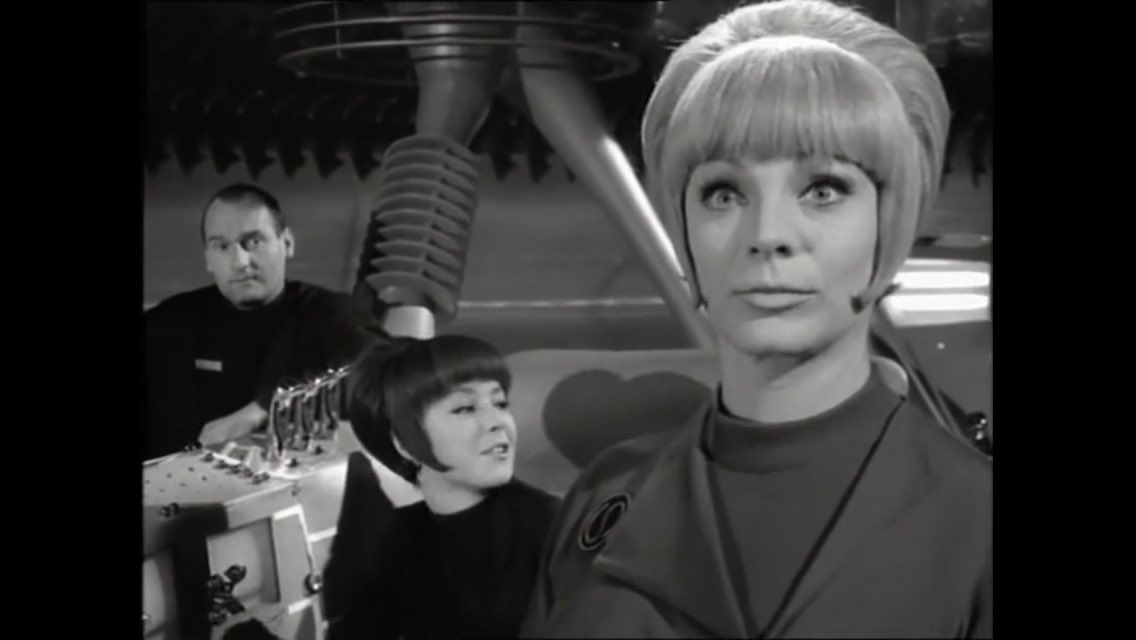
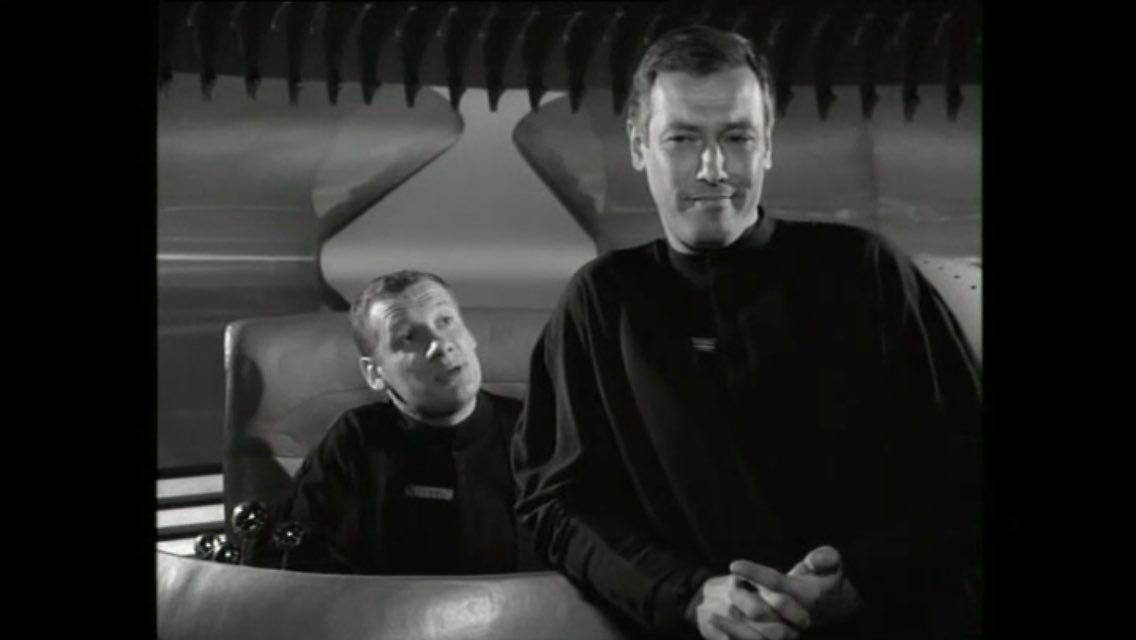
Ibsen wants to pilot one of the Orion's Lancet shuttles. After all, he has completed a training class. Worse, Ibsen insists on flying alone without backup. McLane is not happy about this, but finally relents. Besides, Ibsen's flight will be controlled by a guide beam, so what could go wrong?
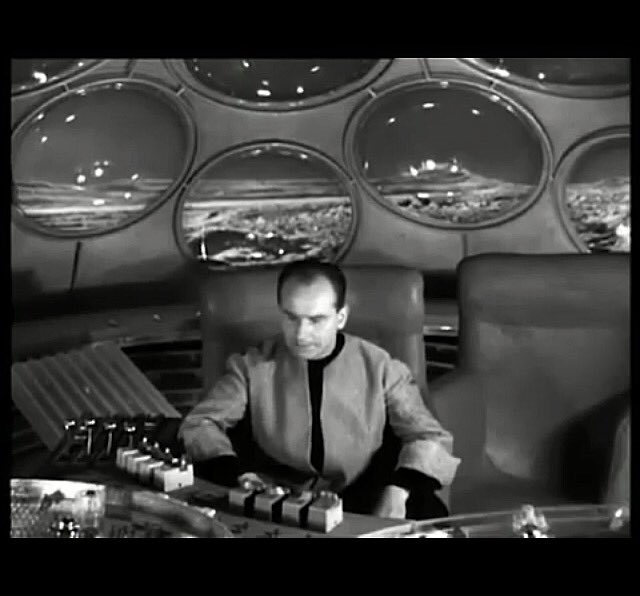
Everything, it turns out. To begin with, Ibsen switches off the guide beam, insisting that he can fly the Lancet on his own, and promptly drifts off course. Worse, spatial disturbances interrupt communications between the Lancet and the Orion. Finally, Ibsen is forced to land on a barren asteroid. He tries to take off again twice, but each time, the Lancet cannot leave the asteroid's gravity field. Ibsen leaves the craft to determine what's wrong and is promptly captured by armed men.

Meanwhile, the Orion is desperately trying to contact Ibsen, while back on Earth, General Wamsler and Lieutenant Spring-Brauner are desperately trying to hail the Orion to satisfy the secretary of interplanetary affairs (Hans Epskamp) who is worried about his future son-in-law.
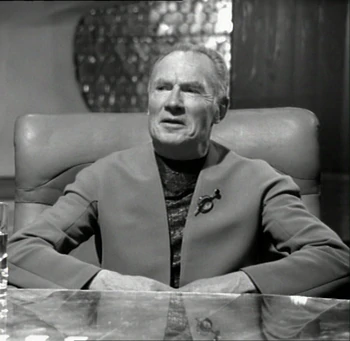
He is absolutely right to be worried, too, for when we next see Ibsen, he is tied to a chair, being interrogated by an unseen voice and threatened with two glass bulbs emitting so-called "omicron rays" on either side of his head. The unseen voice is very interested in the Orion and her crew. Ibsen, who is not the sort of person to withstand interrogation for long, spills the beans. He is then ordered to hail the Orion, tell them that he was forced to land on the asteroid Mura and ask them to pick him up.

Prison Asteroid
The Orion crew are relieved to hear that Ibsen is alive and well, but surprised that he ended up on Mura, because he was nowhere near Mura when they lost contact.
However, picking up Ibsen will pose a problem, because the only ships authorised to land on Mura are supply ships and the vessels of the Galactic Security Service GSD. Luckily, McLane has a member of the GSD on board in the form of Tamara who authorises the mission. McLane's brief conversation with Tamara not only demonstrates that McLane is still jealous of Ibsen, much to Tamara's amusement, but also gives us some additional worldbuilding details.
Mura, it turns out, is a prison asteroid, which is why it's off limits to everybody except the GSD. McLane is appalled at banishing people to a barren asteroid for the rest of their lives, whereupon Tamara replies that Mura is really quite humane. After all, they used to imprison or execute offenders, so Mura is surely an improvement. McLane asks if the inhabitants of Mura are all criminals; Tamara replies that a lot of them are malcontents and some actually used to be celebrities.
The opening narration of every episode (courtesy of veteran actor Claus Biederstedt) presents Space Patrol Orion as a utopian fairy tale from the future, but this brief conversation between Tamara and McLane adds some anti-utopian notes. For not only is the Earth government perfectly willing to let its own citizens die, as demonstrated in episode 2, and willing to launch a preemptive strike against anybody they perceive to be a threat, as seen in episode 6, they also dump malcontents, criminals and troublemakers on barren asteroids in deep space. Combined with the hints last episode that Earth suffered widespread environmental devastation, these new revelations put some wrinkles in the image of a democratic utopian future.
Unfortunately, the episode promptly undermines these hints that life on Earth and its space colonies in the year 3000 AD is not as pleasant as it has been presented so far by making the prisoners on Mura irredeemable villains. For at least the prisoners we see are no mere malcontents, but criminals and murderers.
Behind Bars
As soon as the Orion lands on Mura, they receive a call showing them Ibsen strapped to a chair and about to have his brain fried by omicron rays. The same sinister voice that interrogated Ibsen informs the Orion crew that Ibsen will be killed unless they surrender.
Ibsen is a pain in the backside and no one aboard the Orion likes him, but as McLane points out, they can't just let him die either. So the crew surrenders and is immediately surrounded by armed men and taken to the command center. The male and female crew members are locked up in separate cells, while McLane is taken to meet the leader of the prisoners.
This leader – and unsurprisingly also the owner of the sinister voice we heard before – turns out to be a man called Tourenne, a scientist who developed a devastating weapon known as paralysis rays, and decided to test it on human subjects, killing countless people. Tourenne is utterly unrepentant of the crime which got him exiled to Mura. In many ways, Tourenne is reminiscent of the Nazi scientists who conducted experiments that killed hundreds of people and were still allowed to continue their work after the war.
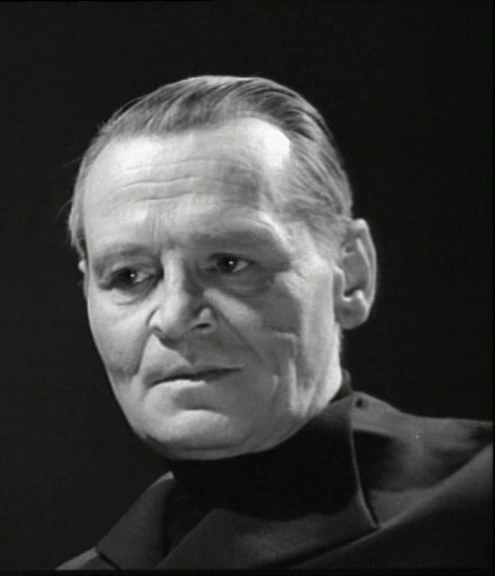
But while Tourenne may not be repentant, he is certainly furious at the Earth government that sent him to Mura. Therefore, he and his followers plan to hijack the Orion and defect to the Frogs. McLane is horrified; surely not even an archvillain like Tourenne would side with the Frogs against humanity. Tourenne, on the other hand, hates the Earth government so much that he would side with the devil himself.
The Return of Dr. Mabuse?
So far, Space Patrol Orion hasn't offered any memorable villains. The Frogs usually remain off stage and are only briefly glimpsed. She, leader of Chroma, was not a villainess but rather someone whose legitimate aims collided with those of the Earth government. Indeed, the closest thing to evil we've seen in Orion so far are unscrupulous generals like Marshall Kublai-Krim or Sir Arthur.

Tourenne, on the other hand, is not only memorable, but also a true villain. Played by Wolfgang Büttner with a sinister air, Tourenne is a monster who delights in inflicting pain and wants to kill the entire Orion crew. In his megalomania and sadism, Tourenne reminded me of Dr. Mabuse, the supervillain who starred in eight films between 1922 and 1964. The cinematography with its sharp black and white contrasts, which keeps Tourenne in the shadows with only part of his face visible, is reminiscent of the heyday of German expressionism in the 1920s and makes the Mabuse parallels even more notable. And considering that Dr. Mabuse is a malevolent spirit who jumps from body to body, it's quite possible that Tourenne is his latest host.

Though strapped to a chair, McLane tries to persuade Tourenne that killing him and the rest of the Orion crew would be a big mistake, because no one but the crew can fly the ship. Tourenne reveals that there are space fleet officers incarcerated on Mura, including a commander who murdered his astrogator in a fit of jealousy.
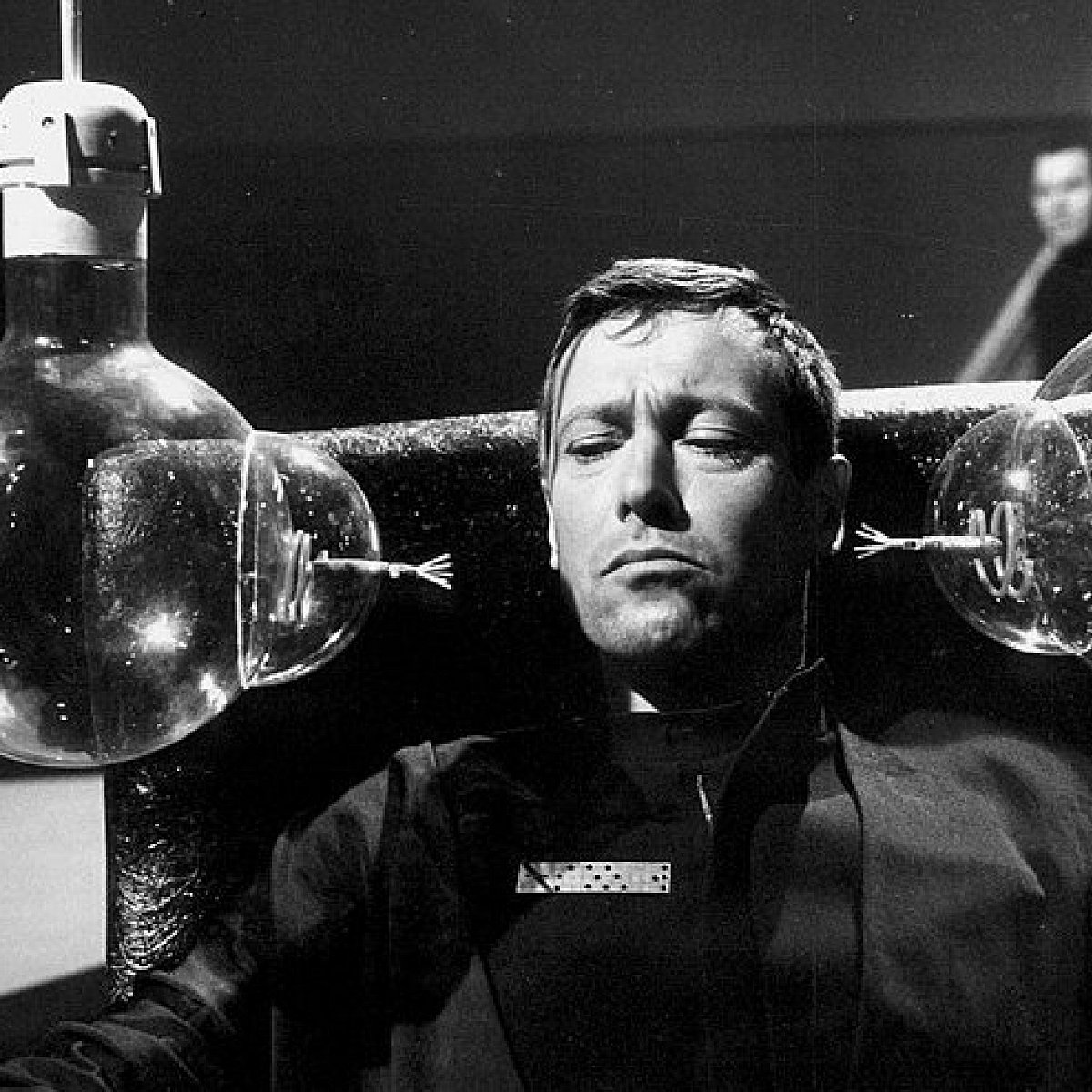
McLane insists that technology has progressed so quickly that even a spaceship commander won't be able to make heads nor tails of the Orion's controls after a few years on Mura. Tourenne, however, isn't buying it. He threatens to murder Ibsen in front of McLane's eyes, because he certainly doesn't need a science fiction writer. Then he'll kill Tamara, who as security officer isn't required to fly the Orion either. And then Helga and so on…
Women in Prison
Meanwhile, Tamara and Helga find themselves locked up together in a cell. Both initially assumed that they were the reason the prisoners captured the Orion, since a prison asteroid will have a severe lack of women. The look on Tamara and Helga's faces at this prospect suggests that they found Robert A. Heinlein's The Moon is a Harsh Mistress as unappetising as I did. But since they haven't been sexually abused yet, Tamara notes that the prisoners appear to be more interested in the Orion than in any of her crew.
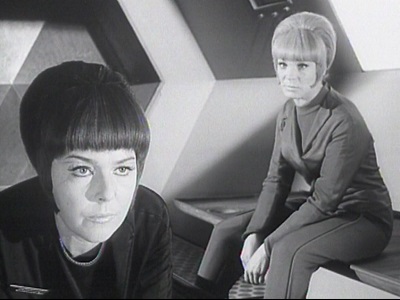
However, the chronic lack of women on Mura gives Tamara and Helga an idea. And so Tamara hides out of sight, while Helga proceeds to hail the guard on the intercom system to flirt with him and also to inform him that Tamara has escaped. When the guard enters the cell to investigate, Tamara and Helga overpower and disarm him. Thus far, the two female members of the Orion crew have often been shown at odds with each other, so it's good to see them working together. Furthermore, Helga, who has often been sidelined, gets plenty to do in this episode.
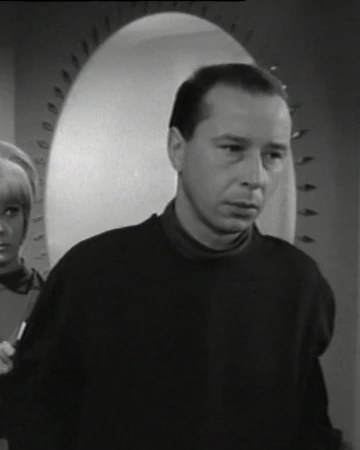
Tamara and Helga force the guard to open the cell in which Hasso, Mario and Atan have been imprisoned. Together, they make their way back aboard the Orion. Hasso hails Tourenne and informs that he has overloaded the energy system. If Tourenne does not release McLane and Ibsen, Hasso will blow up the Orion and Mura along with it. There are shades of the recent Star Trek episode "The Corbomite Maneuver" in Hasso's bluff, but Hasso manages to sell it convincingly, because few people manage to put more contempt in the word "swine" than Claus Holm.
Tourenne seemingly relents and lets McLane and Ibsen go, but of course he still has an ace up his sleeve. For once the Orion tries to take off, it is pulled down to the surface of Mura again. The same thing happened to Ibsen's Lancet earlier. The prisoners have set up a magnetic dome, which absorbs any energy that is deployed to break through it.
Reaction and Counterreaction
A gloating Tourenne hails McLane and demands to be let aboard the Orion. He also informs McLane that his men took all weapons, so the crew are helpless. The crew still has the one ray gun that Tamara took from the guard she and Helga overpowered, but Tourenne forces McLane to relinquish the weapon, after he threatens to strip-search the crew, "which the ladies would find quite unpleasant".
So McLane is disarmed. He gives coded instructions to his own crew, while keeping Tourenne and his men in the dark. And because the Orion crew are so well attuned to each other, they understand just what McLane plans. Mario launches a Lancet against the magnetic dome, briefly breaking open the dome and allowing the Orion to escape. The ship is badly shaken and the crew uses the resulting confusion to take out Tourenne and his men with impressive judo skills. Helga and Tamara actually hold their own better than their male comrades.
Once all the villains are sedated, the Orion makes her way back to Earth and also calls space patrol headquarters who have been frantic to reach them. The secretary for interplanetary affairs immediately demands to talk to Ibsen, only to be informed that Ibsen got so drunk when the Orion crew celebrated their escape that he can't talk right now. The secretary is indignant and we suspect his daughter, Ibsen's fiancée, will be furious. Let's hope it's not to late to call off the wedding.
A Prison Thriller in Space
I know I'm repeating myself, but Raumpatrouille Orion really keeps getting better with every episode. If the final episode of this series manages to keep the promise set by the first six, it promises to be stellar.
Star Trek and Raumpatrouille Orion have no way of influencing each other due to airing too close together, but both shows tackle similar themes. And so Star Trek had a space prison episode with "Dagger of the Mind" some three weeks before Orion followed suit with "The Space Trap".
Though very different, both episodes managed to comment on the ethics of prisons, punishment and rehabilitation. I suspect that two different science fiction shows airing on two different continents tackling the same theme is due to the fact that in the real world, prison system still rely on facilities and procedures developed in the 19th century and are in dire need of reform.
Both Star Trek and Raumpatrouille Orion assume that the death penalty will no longer be an issue in the future (though Star Trek apparently threatened a character with the death penalty in "The Menagerie"), but then the death penalty thankfully seems to be on its way out. West Germany abolished the death penalty in 1949, though East Germany still executes people on occasion, most recently concentration camp doctor Horst Fischer who was guillotined in July of this year. In the US, many states retain the death penalty, though executions are increasingly rare. The last US execution to date was that of James French, a murderer who was eager to die and was granted his wish in August 1966. He cracked a joke about "French fries", before he was electrocuted.
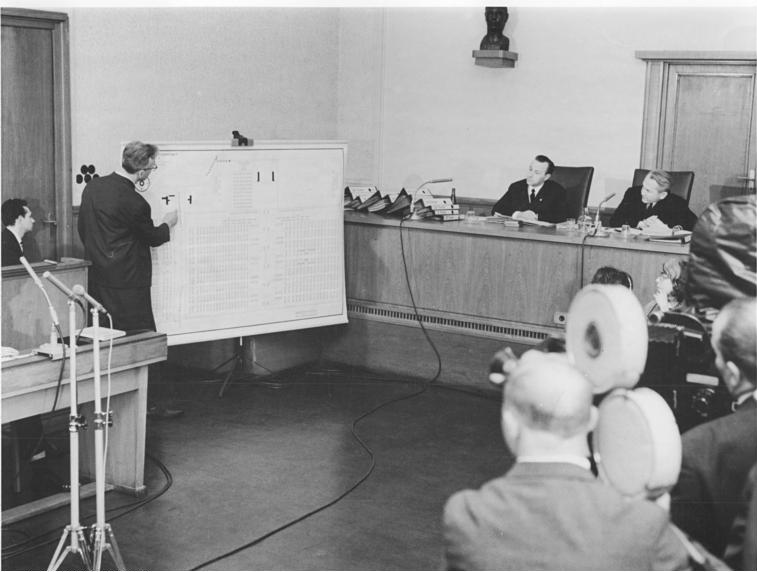
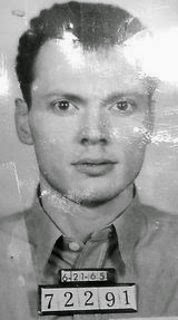
Unfortunately, Orion undercuts the criticism of the ethics of exiling criminals and troublemakers to Mura by making Tourenne not a misunderstood malcontent, but a sadistic villain. We don't learn a lot about the other prisoners; the only one whose crime is described is a murderer.
But even though "The Space Trap" misses an opportunity for social criticism, it's still an excellent episode. Let's see if the last episode of this series can uphold the high standard set by its predecessors.
Five stars
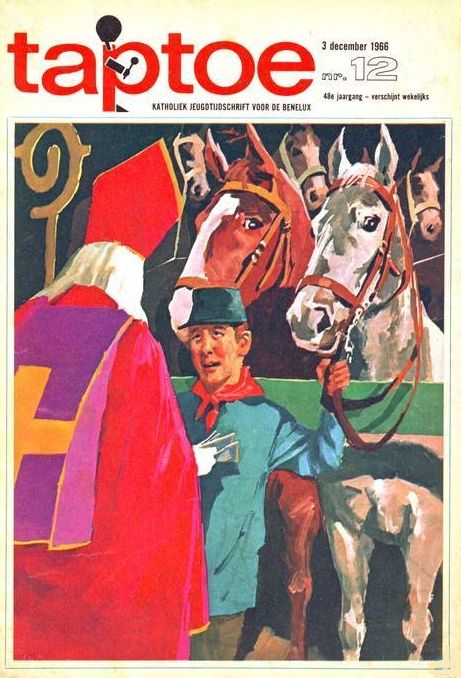
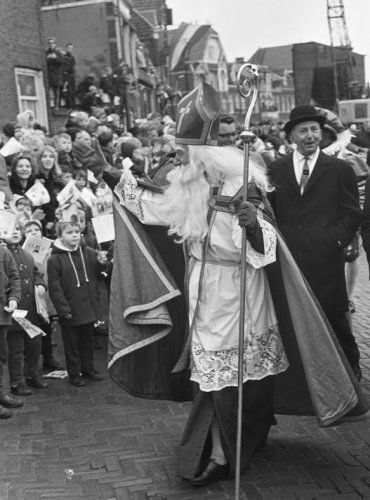
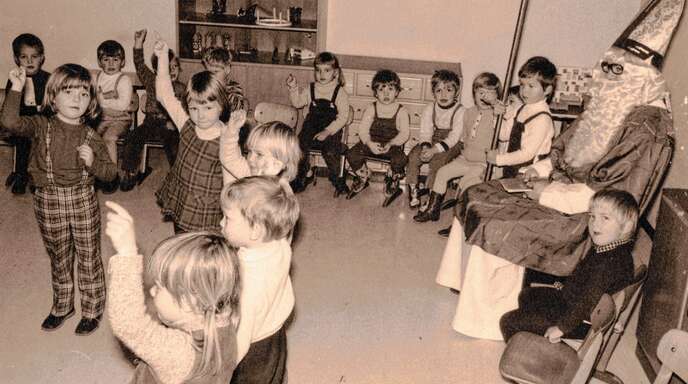
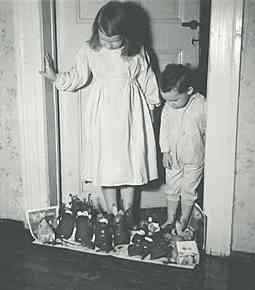

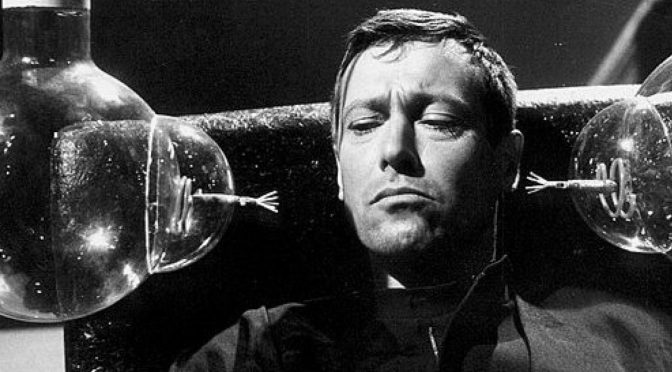
Absolutely the best episode so far. At least once they got to Mura. Some of the stuff before that was a little weak, things happening because they were needed to advance the plot and so on. But overall, very good.
The show does seem to be a little conflicted about its own genre, though. There was that "science fiction" joke at the end of the first episode, and I seem to recall the occasional snide comment here or there. This time, they seemed to go out of their way to be rather dismissive towards science fiction and science fiction fans (and authors, for that matter). I don't know what the intent is, but alienating your core audience seems like a bad decision.
Yes, the whole "Ibsen behaves like a complete and utter idiot" stuff at the beginning could have been cut, though seeing Tamara trying to make McLane jealous was well worth it. I'm also not sure that we needed to see Spring-Brauner drone on about the panspermia theory, but again it made for a funny scene.
Making Ibsen specially a science fiction author rather than just an author of adventure fiction in general seems like a strange decision. Because whatever science fiction will look like in the year 3000, I suspect it will no more concern itself with spaceships and space battles than modern SF concerns itself with cars and highways.
But the Mura scenes make up for the weaker beginning.